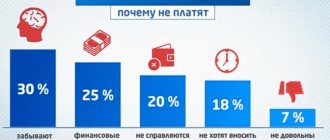Vladimir Putin's fourth term was marked not only by May decrees, but also by a whole package of programs improving the financial situation of Russians. In particular, quite recently the State Duma developed and adopted in the second reading a bill according to which it will be prohibited to withdraw funds from pension payments and benefits. Of course, the law has not yet been adopted and, moreover, has not yet entered into force, but this is an important milestone in reducing the overall “debt burden”. In this article, we study the new bill and also point out legislative possibilities for reducing the amount of monthly payments to bailiffs if the debtor’s only source of income is a pension, alimony or benefits.
Does a bailiff have the right to seize a pension?
Previously, the answer to the question whether bailiffs can calculate debt from pensions was unequivocal: yes, they can. True, with certain restrictions: an amount in an amount not exceeding 50% of the receipt of funds . In some cases, this figure could be increased to 70% - if, for example, the debtor must additionally compensate for damage to health or moral damage.
Before the new law prohibiting bailiffs from deducting pensions came into force, the debtor was often left with only the minimum subsistence level from the initial receipt of pension benefits, according to Art. 440 of the Civil Code of the Russian Federation. In addition, the debtor had to prove to law enforcement agencies the intended purpose of the account.
Note: an account can be considered a target account only if it was opened for the purpose of receiving any social benefits. If you opened an account “for education”, “for buying a car”, etc., this will not be considered opening a target account.
Previously, it was possible to repay the amount of debt from pension payments. This right was enshrined in Federal Law No. 229-FZ of October 2, 2007 On Enforcement Proceedings .
Now there is a whole range of payments and benefits from which bailiffs do not have the right to collect. This will happen if the corresponding bill is adopted by the State Duma.
What types of pensions cannot be seized?
Key changes in this area occurred with the initiation of a bill, which is popularly known as the “law prohibiting withdrawal of money from pensions.”
Please note: this bill has not yet been passed. It just recently passed the second reading in the State Duma, the third reading is yet to come. Thus, it is too early to say that this law has been adopted - it must undergo a third reading, after which it will either come into force, be rejected, or come into force with amendments.
If this bill is actually adopted, bailiffs will no longer be able to collect funds to pay debts on loans and housing and communal services, if these funds come as:
- Certificate for maternity capital (after its use in a particular institution);
- Alimony;
- Child benefit;
- Funeral benefit;
- Financial compensation for causing harm to health;
- Pension for the loss of a breadwinner. The inclusion of long-service pensions in this list is also being discussed;
- Social benefits for persons caring for disabled people.
Income tax refund for pensioners
A pensioner can return income tax in the following cases:
- The pensioner works and receives taxable income.
- The pensioner worked for the last three years, which preceded the period when the deduction arose, and received income that he can transfer (paragraph 4, paragraph 3, article 210 of the Tax Code of the Russian Federation, paragraph 10, article 220 of the Tax Code of the Russian Federation).
- Mandatory pension contributions were transferred to a non-state pension fund or voluntary contributions were transferred.
This article will tell you about the nuances of calculating pensions.
What can be the basis for arresting a pension?
Although at the moment it is too early to say that bailiffs will be prohibited from seizing funds from pensions, the bill still has a great chance of passing the third reading.
And it provides not only instructions regarding which payments are prohibited from being collected. It also contains regulations regarding the grounds for seizure of social payments (benefits, alimony, pensions, etc.):
- If the borrower does not pay at least the interest on the loan for a long time;
- If there are debts to pay alimony;
- If the debtor has unpaid utility bills.
In this case, the decision to initiate enforcement proceedings is made exclusively by a court - district, magistrate or arbitration. Even if the pension is seized, the bailiffs still do not have the right to completely seize the funds - the amount of the seized funds is always set in relation to the total amount of the debt.
How much can bailiffs deduct from pensions?
Here you need to immediately clarify:
- If the client does not notify the bailiffs about the purpose of the account, they may completely block the pension card or pension account. Thus, absolutely all funds will be spent on enforcement proceedings;
- If the client notifies the bailiffs, the amount can be significantly reduced.
Notification of the assignment of the account must be submitted to the bailiffs in writing. You need to document that it is to this account that the social payments you need are received. If this is not done, the maximum retention percentage will be 100%.
The Federal Law “On Enforcement Proceedings” answers the question of what part of the pension can be retained by bailiffs after confirmed notification of the intended purpose of the account. This is no more than 50% of incoming funds .
If, after deducting 50%, the amount remaining is less than the subsistence level in the region of the debtor’s permanent residence, part of this amount is returned to the debtor’s account. Thus, depending on the size of the pension, collection can be made in the amount of 0-50% of the initially received funds.
If the debtor caused health damage and/or moral damage to the plaintiff, bailiffs have the right to seize up to 70% of the pension.
Liability for non-payment of debts
For evasion of debt repayment under a writ of execution, administrative and criminal liability may be imposed on the debtor. As an administrative penalty, a fine may be imposed on the debtor, and in the case of criminal liability, the maximum penalty will be imprisonment of the debtor.
The most common measures taken administratively against a defaulter:
- penalties (according to Article 17.14 of the Code of Administrative Offenses of the Russian Federation);
- seizure of bank accounts;
- imposing a ban on driving and traveling abroad (Article 67 of Law No. 229-FZ);
- announcement of an executive search for the defaulter and his property (Article 65 of Law No. 229-FZ);
- forced delivery for drawing up an administrative protocol (Article 27.2 of the Administrative Code);
- temporary imprisonment of the defaulter for the application of administrative measures to him (Article 27.3 of the Code of Administrative Offences).
In order for non-payment of debt to be considered a criminal offense, the actions of the debtor must contain the elements of a crime, namely:
- the debtor must maliciously evade payment of debts;
- the debtor may provide false information in order to reduce the amount of debts, etc.;
- the debtor may be hiding from the bailiffs.
If the debtor is identified, he will be subject to criminal punishment, and debts will be withheld from his pension.
The debtor should carefully monitor his debts, since in some cases, when debt arises, bailiffs may block all of the debtor's accounts. In practice, there are situations when, due to a debt of 20,000 rubles, accounts worth 1,000,000 rubles were blocked.
The debtor may simply find himself out of touch with life, especially considering that the seizure of the debtor’s accounts and plastic cards can be carried out even without notification of this by the bailiff.
In addition, debts prevent the debtor from crossing the border. Therefore, a long-awaited vacation in Europe may be disrupted due to a small debt on utility bills of 5,000 rubles. If there is debt, a visa may be denied.
How to remove restrictions caused by debt in 2021
You can get rid of social restrictions (traveling abroad), as well as unblock accounts only after full repayment of the debt. It is worth noting that if there is a debt, banks very quickly block cards, literally in a matter of hours. But it may even take several days to unlock.
To lift restrictions in 2021, the debtor must obtain a statement of debt repayment from the bailiff, and with this statement contact the bank to unblock the accounts. If your visa is refused, after receiving the extract, you can try to apply for a visa through the appeal process (check with the visa center for more details) or submit your documents again.
What to do if the bailiffs seized your pension?
Of course, the new bill implies that pensioners will be protected from bailiffs. But to get such opportunities, the pensioner himself will also have to work hard. The simplest action to take is to send an alert. This already saves the pension from complete seizure, leaving the debtor with at least 50% of the originally received benefits.
Any enforcement proceedings begin with a court decision. Take the order issued by the court in your case and study it carefully. Find out in this document how much funds should be withdrawn from you, as well as who exactly is involved in your production. If the document does not indicate information about the persons involved in your case, information on this issue can be found on the website of the FSSP (Federal Bailiff Service).
Next, the bailiff will send the debtor a notice of the commencement of enforcement proceedings. At this moment, the debtor has the right to notify the FSSP employee that he wishes to voluntarily repay the debt within the agreed period. If the debtor does this, he will have the opportunity to defer payments, achieve debt restructuring, installment payments, and also reduce the amount of the monthly payment in exchange for increasing the duration of proceedings.
Just after receiving such a notification, you need to send an application to the FSSP employee with a request not to completely withdraw funds from the pension account. Indicate the details of your pension account in the document and attach documentary evidence of the intended purpose of the account. For example, a copy of a pension certificate, an account statement indicating the sender of funds, etc. can serve in this capacity.
From this moment on, the bailiff will not confiscate the entire incoming pension, but only a part - from 0% to 70%, depending on the size of the pension (0% is possible for a pension equal to or less than the subsistence level in the region of residence).
Appealing an unlawful recovery: sample document
An administrative complaint is filed with the court, a higher bailiff or the prosecutor's office. The period is no more than 10 days from the time you learned about the offense against you. The document review period is no more than 10 days. It is worth considering that in the prosecutor's office this period can be extended to 30 days.
The complaint includes the following points:
- The name of the higher authority with its address.
- Your data with the exact address of registration or residence.
- Title of the official paper (complaint).
- Content. Indicate the name of the case and succinctly state the circumstances in official language, mentioning the amount of the write-off and its date.
- Link to the law regulating enforcement proceedings.
- Requests set out according to the list (recognize the actions of the performer as unlawful, oblige representatives of the service to return the money illegally written off to the pension card).
- Applications. Provide evidence that the money was withheld specifically from the received pension.
- Date of compilation, your signature.
Hotline for citizen consultations: 8-804-333-70-30
The document is drawn up by hand or in printed form. The exact form of the complaint is not provided, so it can be drawn up in any order, in compliance with business style standards.
How to protect your pension from bailiffs?
So, in the last paragraph we have already explained that it is very important to send the bailiff a notice of the assignment of your pension account. Be sure to indicate that your pension is your only source of income. Otherwise, the bailiff may seize the benefits, believing that you have other income.
Please attach an account statement to your application, which will be stamped by the bank and signed by an authorized bank employee. If you do everything correctly, the bailiff, according to the law, will issue a decree to reduce the amount collected from the debtor’s special account. The reduction will be made by 30-100% depending on the size of the pension.
Attention: if the debtor has dependent children or incapacitated relatives, he will almost certainly receive a seizure of his pension in the amount of no more than 30% of the benefits received.
What to do if bailiffs continue to confiscate 100% of your pension?
If the notice was ignored and 100% of the pension is still withheld, the pensioner needs to complain either to the Chief Bailiff of the FSSP or to the prosecutor's office. If the complaint is sent to the FSSP, then it should be addressed to the bailiff who exercises direct control over the employees collecting funds from the debtor. Documents confirming the purpose of your account must be attached to your complaint.
Based on debt collection practice, such complaints are almost always satisfied. Exceptions are possible only if the debtor has “disclosed” his income in addition to the pension - for example, income from unofficial/official work, part-time work, regular financial assistance from children, etc.
Therefore, before filing a claim or complaint, you should carefully check whether the documentation you provide contains any information about additional income. Bailiffs must think that your pension is your only source of income, otherwise it will be very difficult to achieve a reduction in payment.






